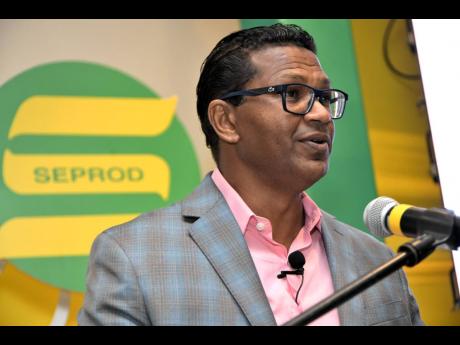Straw import loophole - Drink manufacturers urge government fix, further delay of phase-three ban
Plastic drinking straws should be off the market by mid-year, but Jamaican manufacturers say they have identified a loophole that gives juice importers an advantage and which they are urging Government to plug before the third phase of the ban is...
Plastic drinking straws should be off the market by mid-year, but Jamaican manufacturers say they have identified a loophole that gives juice importers an advantage and which they are urging Government to plug before the third phase of the ban is implemented.
The Jamaica Manufacturers and Exporters Association, JMEA, says that the regulations do not cover imported tetra pak and pouch-packaged juices in 200 millilitre sizes that come with straws attached.
So while the importation, manufacture, and distribution of drinking straws are generally banned, straws attached to imported juices are not. Neither has the Jamaican Government given the authority to the Jamaica Customs Agency to do strict monitoring of plastic straws on juices at the ports, the beverage makers say.
But it also turns out that the manufacturers have another beef with the Government as well. Instead of the two-year delay that they sought for phase three of the ban, they only got six months.
Juice manufacturer Peter McConnell, the managing director of Trade Winds Citrus Limited, which produces the Tru Juice and Fresshhh brands, said a case was made to the Government from July 2019 as to why they needed more time to transition.
“We are dissatisfied for several reasons,” said McConnell. “We are very disappointed that this presentation was either ignored or considered highly inaccurate as it had very little effect on their decisions. We were shocked and unprepared when we were told in December 2020 that only a six-month extension would be granted.”
With less than three months to implementation, there is no mechanism in place to address the importation of beverages with plastic straws attached, he said.
Jamaica began implementing the ban on single-use plastic bags, styrofoam containers, and straws in early 2019. One of the most affected companies was Trade Winds Citrus’ distribution partner and co-owner, Wisynco Group Limited, which made the products under its ‘Sweet’ brand. The ban killed that business for Wisynco, erasing annual revenues of $1 billion, the company has said. Plastic straws accounted for just around one-tenth of a per cent of that, or $1 million.
Plastic straws are now mainly sourced from Colombia. But once the ban takes effect, the dominant source market for alternatives is expected to switch to China.
Richard Pandohie, CEO of Seprod Limited, says his company, which manufactures milk and juices under the Serge, Cool Fruit and Swizzle brands, imports 65 million straws annually at a cost of about US$192,000. He says that that import bill is projected to more than double to US$415,500 when Seprod switches over from plastic straws to alternatives at mid-year.
“That’s a massive difference. We will not be able to absorb this difference, and it will result in price increases,” said Pandohie.
“The issue now is that several potential suppliers of alternative straws have not yet reached the stage of commercial production. But we are hoping that as volumes of the alternative increase globally and production capacity is installed, prices will eventually come down.”
McConnell made a similar argument, saying that in addition to the cost of the raw material nearly tripling, the implementation of the phase-three ban during the pandemic was unfortunate and poorly timed.
Large conglomerate GraceKennedy, which produces various beverages, is not on board with consumers being made to bear the brunt of the increases. Those costs, said GK Group CEO Don Wehby, should be absorbed by manufacturers.
Wehby said that after significant research and discussions with our brand partners, the conglomerate was able to identify a feasible paper straw solution and made the transition to paper straws for its affected products – Capri Sun and Tropical Rhythms – in November 2020.
“Although the paper straws currently come at a greater cost than plastic straws, the overall effect on the price of our products has not been significant, and we do not anticipate any related impact on sales,” he said.
Wehby, however, noted that GraceKennedy supports the JMEA’s calls to the Government of Jamaica, GOJ, to strengthen enforcement as it relates to the importation and distribution of non-compliant products, including increasing inspections at the ports and in the marketplace.
“It is critical that there is a level playing field for imports to Jamaica, and the GOJ must ensure that those in compliance with the ban are not placed at any disadvantage. Enforcement is essential for the ban to be effective and the desired outcome to be achieved – a clean and healthy environment for all Jamaicans,” he said.
The ban on plastic bags and drinking straws comes amid a downturn in sales for both manufacturers and distributors of the tetra pak and pouch juices, largely as a result of the closure of schools, one of the biggest markets for beverage traders. Since the onset of the pandemic in March 2020, sales of the 200ml juices, which are packaged with straws, are said to have declined by 40 per cent.
Pandohie, who is also president of the JMEA, says the group has asked again that GOJ further delay the third phase of the ban until the mechanisms are in place at Customs to ensure strict enforcement against plastic straws entering the country.
The portfolio minister, Pearnel Charles Jr, who heads the Ministry of Housing, Urban Renewal, Environment and Climate Change, did not respond to requests for comment on the issue.
One of the issues that the JMEA wants clarity on is whether Jamaican manufacturers can continue making plastic straws but for foreign clients only.
“One major local company just landed a significant contract manufacturing for Bolivia, and it would simply be nonsensical to put this contract at risk for a legislation that does not apply to that country,” said Pandohie.
“If the ministry is having a trust issue with the local players, then the JMEA has recommended that simple controls such as inventory, production quantity, and evidence of exports be put in place,” he said.
Charles has promised engagement with the private sector on issues that arise under the ban. He has already committed to exploring measures to strengthen regulation of single-use containers after data showed that imports of non-biodegradable packaging had increased under the ban.



